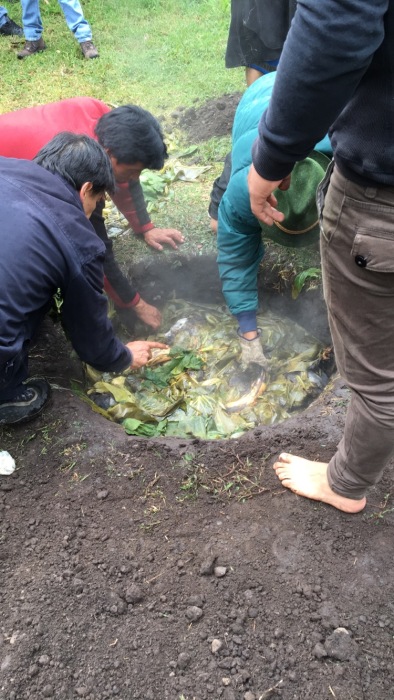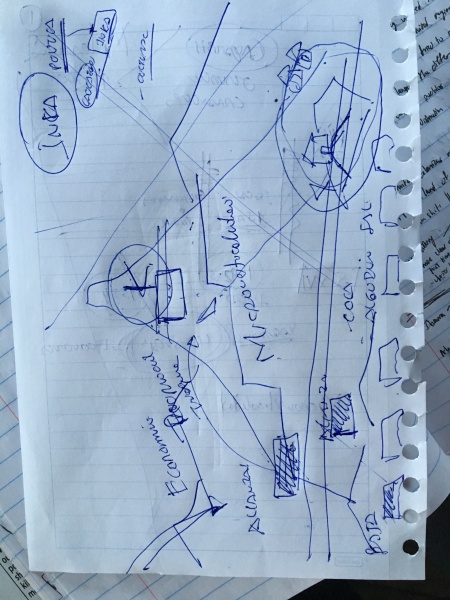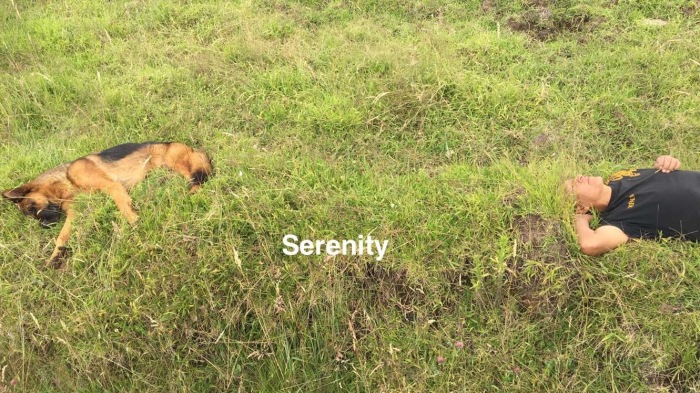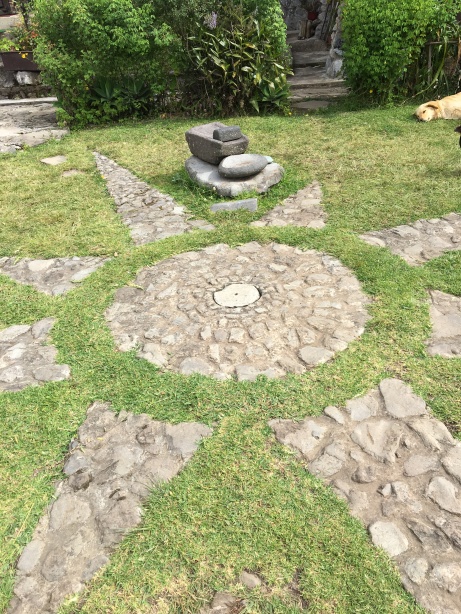
In 1929 physicist Paul Dirac united Einstein’s theory of energy conservation (E=mc2) with Schrodinger’s generalized wave equation which characterizes the energy associated by the spin of a particle (c2p2) to create a relativistic equation that he argues could potentially describe the energy of any wave (and therefore all of the manifestations of the universe).
The united equation is E2 = c2 p2 + m2 c4, but the interesting part about this equation is that it is quadratic – therefore there are two symmetrical solutions of negative and positive energy. Now, typically from as long as I can remember doing physics, we usually are taught to disregard the negative solution because things like negative energy would imply that particles are thus moving backwards in time, which can’t be possible right? Around this time, the concept of entropy had been accepted as one of the laws of the universe – that everything tends towards disorder, the universe is continuously diverging, and each manifestation of the universe is directly determined by preceding events (causes always precede effect). Therefore, many physicists ruled out Dirac’s negative solution and evolved the equation into what is today called the Standard Model (SM) for explaining and predicting wave behavior. But two physicists Feyman and Stuckelberg weighed in on Dirac’s equation and said that you can’t just disregard half of the solution and that it is worth investigating whether a negative energy solution is in fact a negative energy particle travelling backwards in time, or equivalently, a positive energy antiparticle going forwards in time.
One place we see this reversal of linear time, or retrocausality, is in black holes. Black holes, unlike the supposedly entropic nature of the rest of the physical world, are distinctly converging systems. The reason why one cannot see light coming or why people say matter is being “sucked in” by black holes is because in converging systems retrocausality rules and energy moving forward in time is the impossible not the other way around. Converging systems are interesting anomalies because they really put universal laws such as entropy and gravity in interesting positions. However, Dirac’s equation – which is supposed to describe all waves of the universe – provides an equal negative solution to the customary positive energy. That would mean that for all of the entropy/divergence in the world there should technically be an equal amount of converging/backwards-flowing energy in the world, so more than just black holes. This is why this equation is particularly scrutinized because in physics labs it’s kind of impossible to observe whether a particle is technically moving backwards-in-time or forwards.
Some physicists and mathematicians argue that retrocausal forces go down at the very sub-atomic level to account for the negative energy. But one renowned mathematician in the early-mid-1900s Luigi Fantappié, in his Unitary Theory of the Physical and Biological World, argued that people are forgetting one converging system that’s a big fucking deal – life. When examining the characteristics of converging systems (increased differentiation, complexity, and structuring) and talking to a biologist friend, Fantappié surmised that life is driven by retrocausal/converging forces as well – life instead of being attracted by the past is driven by the future! For example, if Fantappié had lived until 1969, he would point to the scientist Elsasser’s paper A Causal Phenomenon in Physics and Biology: A Case for Construction: which argues that the probability of amino acids to form a simple protein is around 1/10600 simple events (by the nanosecond) while in the 13-15 billion years of the Universe there have only been 10106 simple events possible. That makes the likelihood that amino acids could organize into a simple protein nigh impossible – much less survive entropic forces to organize into cells, complex organisms, beings with consciousness etc. Fantappié would be skeptical about the accepted “randomness” of the universe and would instead contest that life is being guided by retrocaused information in the form of subatomic particles from the future.
How is life then even able to interpret the sub-atomic information of particles? Some argue that it is due to the very unique chemical composition of water (which is essential to all life as we know it). The argument is that hydrogen atoms (part of H2O) are small enough to act as a bridge between sub-atomic forces and the molecular level. Hydrogen bonds and the unique physical properties of water also mirror the characteristics of converging systems – hydrogen bonds are 10x stronger than the more common Van der Waals forces, water is known for its cohesiveness, high specific heat, etc. Therefore, deep within life stored in our hydrogen bonds, the future is apparently guiding us.
Building upon Fantappié’s theory, I think it would make more sense to believe that we are in a world driven by supercausality which is governed both by entropic forces of the universe and the converging forces of life. We are constantly receiving information both from the material world of classic causality (past creates future) and the world of retrocausality (future influences past). This makes for particularly interesting arguments regarding spirituality. In one sense, this could put determinism in a flux by asserting that we are not purely being determined by our physical past and that those moments when you feel as though intuition is guiding you/God is showing you what to do/universe is helping you are really choices that we must make between conflicts of ~rationality/empiricism~ and ~faith~ (energy from future). Others could also argue that the future of life/info that is guiding us is a higher spiritual being such as a God or that we are being driven towards Its domain (I’d like to think that all of time is simply a loop but I guess we will see lol). Fantappié even argued that in deep states of meditations when one feels as though time and self is lost – that this is simply you connecting completely with the information of the future and that you’re actually experiencing time as it really is happening – past, present, future all at once. This perception of time is also very similar to the Andean Ñaupa that I mentioned in the “Contra-Hegemony” post. Then there is also the more anti-existential crisis interpretation that without organization, direction, and appreciation of life, we are slipping into the entropy of the universe (the technical opposite of life’s converging system) which makes us feel kinda shitty. Lots of different interpretations to go around for sure.
_________________________________________________________________
And on that, I would like to say a few words about spirituality and the ~journey~ more generally. The shaman Don Juan immortalized in Carlos Castenada’s The Teachings of Don Juan said that there is no journey more difficult than the one totally dedicated to the attainment of knowledge. That “a man goes to knowledge as he goes to war, wide-awake, with fear, with respect, and with absolute assurance.” Why is it so difficult? It is because one has to constantly be scrutinizing your own inherent biases, your upbringing, whatever you are learning, and continuously checking your beliefs with what you are experiencing. There is no respite in the pursuit of knowledge, no institution or book that will give you all the knowledge that you are seeking for. You will constantly be proven wrong; you will constantly be amending your perspective.
In line with skepticism, I think it’s important to talk about dogma and the ruling dogmas of today. Although Fantappié collaborated with some of the leading physicists, his and Dirac’s insistence on the time-traveling particles are constantly marginalized by the mainstream physics. Even the acceptance of antiparticles, negelectrons, new contradictory discoveries with the Higgs Boson, etc. have not led to an overhaul of the Standard Model (instead they legit added 36 more modifiers to account for these “new particles”). Many people follow science as the new dogma without taking the time to understand/explore criticisms of it. There are several arguments that attempt to demonstrate the dogmas ruling scientific thought such as: the strong insistence on a deterministic (cause always before effect) nature of the universe despite contradictions in quantum mechanics and special relativity, the condescension towards indigenous/spiritual wisdoms ‘cuz science always has to know more than the “simple people of the past”, the refusal to acknowledge different epistemologies besides just “logic and thinking”, the compartmentalization of science (lack of communication between different fields), the firing of academics simply who challenge the dogma, etc. Cosmopolitics II by Isabelle Stengers is a thorough but tough read on critiques of science’s claims to objectivity, rationality, and truth.
But dogma exists everywhere. The Buddha himself cautioned against following Buddhism as a dogma and explained that his teachings are his own wisdoms – those he gathered on his own path. You may grow up indoctrinated in/most cultured in learning about the world through science, a monotheistic religion, Marxism/Capitalism, nihilism, whatever. But I believe along the way, because the world is so inherently dynamic and untheorizable, an experience will come around to challenge your existing worldview and you will have to evolve beyond the taught dogma or maintain your course. A dogmatic institution or person is one who will delegitimize or ignore an impactful or perspective-altering experience that you’ve had. Think feminism or homosexuality in some religions, think profound emotional experiences in pure objectivist thought, think changing your life in a positive way after meditation/psychedelic experience but being told that those are tricks on your brain. Think the color of life to nihilism. This is why the pursuit of knowledge is a process of “Learning to unlearn in order to relearn.”
But then how does one know if one is ever truly learning something/seeing truth? – and I think that always comes down to your decision; picking based on what you feel. And not the “I’m happy with this conclusion ‘cuz it makes me feel safe for right now” illusory feelings but the “aah this makes so much sense this is right” lasting contentedness. (You should also always read/understand critiques of your contentedness with a particular idea/system too just to make sure that that comfort also isn’t a product of some other dogmatic thinking). And yeah, that mode of assurance is super-tricky ‘cuz how can you ever convince people that you believe you found truth if its rooted in your experiences and feeling. I guess that’s the hardest part about the quest – that it really firmly is personal.
In context of my time in the Andes, this is pertinent because the cosmovision tries to stay away from dogma as much as it can. Beyond generationally passed down cultural norms and traditions, there is no clear codified set of rules that explain how to be ~spiritual~. The closest thing is that famous sumak kawsay (Buen Vivir coopted by the gov’t) that comparts unspecific goals like harmonious relationship with family, community, nature or peace of the heart in order to demarcate the closest thing to spiritual enlightenment. The trick – whole point of life – is figuring out how to get there, how to live that good life and that takes constant observation and a peaceful life. It’s all very confusing and hard to quite explain, but I think that’s how it’s supposed to be.
Also, I have been having a great time finding similarities between my own experiences and the wisdom of spiritual elders here just talking about vibrations driving the universe, the power of the mind, the energy of nature, the looping of time, and similar understandings of happiness/contentedness which kind of gives me hope that even though the journey is personal and the vocabulary may be different that there may be an objective truth to which we are pursuing.
(This volcano brought me one of the most difficult but spiritual experiences of my life)
Sources:
http://www.sintropia.it/english/2006-eng-1-1.pdf (for brief history of Dirac equation)
https://urldefense.proofpoint.com/v2/url?u=http-3A__www.lifeenergyscience.it_english_2014-2Deng-2D2-2D01.pdf&d=CwICAg&c=imBPVzF25OnBgGmVOlcsiEgHoG1i6YHLR0Sj_gZ4adc&r=ggDKjvJ3moVAqdzLWDkAbQ&m=Jpg4JHV1s_NxeqrM2EyA0Tpsa_3B9cTMUd7IOvyCLQ8&s=ts3tZOcRe_XyNqneWjDUKEDmIai8UmyFyaAfgFJmAmw&e= (interesting interview shown to me by this one tour guide)
https://en.wikipedia.org/wiki/Klein%E2%80%93Gordon_equation (predecessor to Dirac eq)
https://www2.warwick.ac.uk/fac/sci/physics/staff/academic/boyd/stuff/dirac.pdf (derivation of Dirac’s equation)
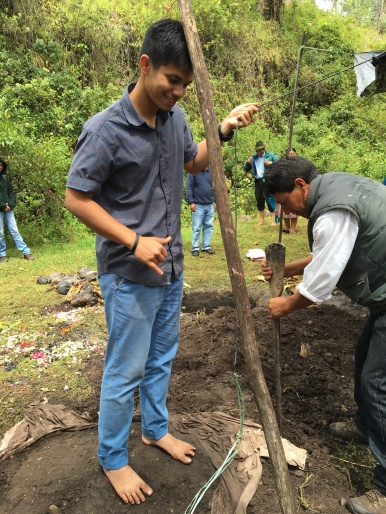 (always improvising out here)
(always improvising out here)